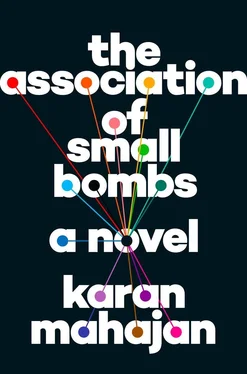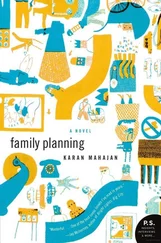In his sleep, he imagined a long trial following his arrest, Tara getting him out of jail; he imagined being vindicated for killing Modi when the man was officially recognized as a war criminal by the International Court at The Hague; he imagined books being written about his heroism, his humble background, his idealism, the world he carried within him, the dozen rooms he’d occupied in different parts of India, his photogenic handsomeness, the dignity with which he endured the indignities of jail.
The distance between these dreams and his ambitions was revealed to him when he shot his shoddy little gun and wiped it with a towel in the evenings. To kill Modi, it was necessary to aim from within a crowd, with people around you, and then through the phalanx of bodyguards that spread on either side of him like the multiveined hood of a snake — he had seen Modi’s setup during his Gaurav Yatra rally in Delhi.
How could he — a small person, in a ruined place, with a gun fashioned from throwaway parts, the rusted infrastructure of the town — succeed?
In May, he took a train to Delhi on the pretext of finding a job. In the cramped compartment, as he bent his neck to read a copy of Turgenev’s Fathers and Sons , a commotion started up. An old man with powerful jaws was demanding a magazine from a bearded student. When the student said, “Let me finish,” the old man started swearing. “You pigs! Fucking Muslims!” The student finally gave up and handed the magazine to the old geezer. But when the old man flipped through it, he snapped again, “This is in English!” and threw it down. Ayub did not intervene. He was light-headed and tired and hungry, the pistol pressed against his hip like a piece of bone, and when he hopped off at Old Delhi Railway Station, he took a rickshaw and then a bus to a vast field full of people. Modi’s rally. Holding his breath, swaggering, he swam through the dam-burst of people: office men, peasants, women covering their eyes with free posters handed out at the entrance. Modi twinkled in the distance behind a stage. You could barely hear him. Nevertheless, Ayub lifted his head and stared at him, and imagined Modi staring back, and he felt something pass between them. He put his small, neat hands in his pockets. He couldn’t do it.
He had planned to meet Mansoor and his Peace For All friends if this mission failed, but he took the train back the next day in despair.
When he got to Azamgarh, he was trembling and twitching from his inaction, a wedge-shaped headache squeezing the top right corner of his skull. He wasn’t sure he could control his face — felt it might split away from him in a series of twitches. Perhaps, he thought, he had brought himself to the point of such stress that he would suffer another physical collapse, implode, experience something much worse than back pain — an aneurysm, maybe, a blood clot, one of those deadly killers that gathered evidence from the rest of your stressed body before detonating the whole sorry scaffolding.
When he ate a meal with his mother and father, he told himself he was seeing them for the last time. He clutched the pistol in his pocket; his eyes felt weak.
This sort of thinking continued for a few days, till he realized he was as incapable of killing himself as he was of killing Modi. Besides, he still loved Tara. He wrote her another letter and posted it to a friend in Benares, who, in turn, typed it and e-mailed it to her (Azamgarh still didn’t have an Internet cafe). Afterwards, he felt happy. Having Tara even once, for a short period, had been a great thing. He visited a prostitute, mastering his disgust by imagining he was making love to Tara, her sweet face turned up, the braid beside her like a watchful dangerous snake that he took in his mouth.
It was in this unstable, ecstatic, endorphin-soaked mood that he went to visit Zunaid.
________
Zunaid was playing cards in his house with friends when Ayub entered; he immediately put the cards down in embarrassment, treating Ayub with honor and respect. “Tell me, Ayub bhai, what brings you here?” Zunaid said, clearing space for him on the charpai, his lips wet with spittle, as usual.
“I wanted to talk to you alone,” Ayub said. “But there’s no rush; play your cards.”
“We can go back and talk.”
“I’d prefer if you all played,” Ayub said. “I’ve brought a paper. I’ll sit and read.”
“No, no, that’s too awkward, you just watching us,” Zunaid protested.
“Abe, play,” one of the men on the charpai said.
So they played and were soon lost in their cards. Whipping the newspaper to crispness (like women whipping clothes to open them out before hanging them on a clothesline), Ayub watched the faces and personalities of the four men in the room and admired their concentration, their ability to find peace, even happiness, in this tragic hellhole of a town. My mistake was to leave in the first place, he thought.
Later, Zunaid and he stood side by side taking a leisurely piss over the garbage dump behind the house. Ayub examined the brands of the wrappers in the garbage, their good fonts, the fine print — he thought of the craftsmanship that had gone into these wrappers and had a strong feeling that, despite all its problems, the country was progressing. The fact that Azamgarh received all the trash of the country was proof that it would someday receive other things as well, that it was not cut off. Someday the trash itself would be of such high value, so beautifully made, that this awful place wouldn’t need an economy at all.
“Are you good at keeping secrets, Zunaid bhai?” Ayub asked, tucking his dick back into his pants.
Zunaid said yes, he could keep secrets.
“You asked me why I wanted the gun,” Ayub said as they walked back. “It was a test. To see if you were trustworthy.”
Zunaid smiled, clearly pleased.
“And you were,” Ayub said. “I’m going to let you in on a secret.” He told him that he had been sent by a political party to recruit people to kill Modi and that he was looking for a team to carry it out. The payment would come from a rich man in Bhopal.
Ayub was dismayed to discover that Zunaid had no idea who Modi was. “Arre, yaar, not the tire company,” he said. “He killed thousands of Muslims in Gujarat.” He proceeded to describe Modi’s atrocities.
“We must take revenge on such a person,” Zunaid said, tears in his eyes. “For our own self-respect.”
“The problem is that he’s well guarded,” said Ayub.
“Don’t worry,” Zunaid said. “We have means.”
The two men talked for a while and then Ayub went home. He was light-headed from excitement, the heat, the wood fires at dusk, the mosquitoes, the angle at which the sunlight pushed dust motes into his room through a small window, making him think again of jail. Maybe the thing to do is to run away from Azamgarh right now, he thought. Before Zunaid tells the police. But the same strangling pleasant inertia, which had been his constant companion these past few months, took hold of him and the next day he returned to work at the farm. He was reminded, watching the farmers in the field, of the opening of his favorite novel, Raag Darbari , the first novel he’d read about his type of town, in which a man dressed in khadi hitches a ride on a truck on the way back to town and is mistaken for a CBI agent. Ayub felt that he too, with these conversations, had turned himself into an agent — an agent for an imaginary organization, yes, but one that, on the edge of this field, verging on madness, he could summon into existence just by thinking about it. And who was to say such an organization didn’t exist? There were thousands of groups trying to kill Modi — yes, one reason he had acted so quickly was because he was afraid of being beaten to it. Yet the presence of these groups gave him the confidence that this work would be completed — if not by him, then by someone else. There would be justice eventually. He didn’t feel alone. The field grew smaller. The branches of the trees seemed to reach out, brown and hard, carved with footholds. There are times in the day when every plant seems to breathe openly.
Читать дальше












